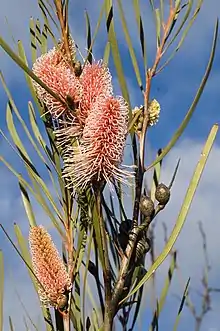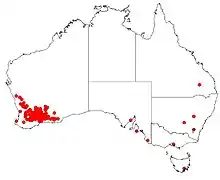| Grass-leaf hakea | |
|---|---|
 | |
| Hakea multilineata growing near Lake King | |
| Scientific classification | |
| Kingdom: | Plantae |
| Clade: | Tracheophytes |
| Clade: | Angiosperms |
| Clade: | Eudicots |
| Order: | Proteales |
| Family: | Proteaceae |
| Genus: | Hakea |
| Species: | H. multilineata |
| Binomial name | |
| Hakea multilineata | |
 | |
| Occurrence data from AVH | |
Hakea multilineata, commonly known as grass-leaved hakea,[2] is a shrub in the family Proteaceae. It is endemic to an area in the Wheatbelt and Goldfields-Esperance regions of Western Australia.[3] It has pink to red long racemes in upper leaf axils and leathery linear leaves.
Description
Hakea multilineata is an upright shrub that typically grows to a height of 1.5 to 6 metres (5 to 20 ft) and does not form a lignotuber. Flowering occurs from June to September producing vibrant pink flowers, which are known for attracting local birds. This flora is also evergreen, retaining its leaves all year round providing an excellent addition to backyards and gardens. The mid-green leaves are flat, broad and linear, 10–20 cm (4–8 in) long to 1.5 cm (0.6 in) wide with visible longitudinal veins ending in a rounded tip. The smooth fruit are ovoid in shape tapering to a small beak. They may be found in clusters or spaced along the branchlets. Hakea multilineata is tolerant of medium frosts and grows best in an open sunny position that is very well drained.[2][3][4][5]
Taxonomy and naming
The species was first formally described by Swiss botanist Carl Meisner in 1848 and the description was published in Plantae Preissianae.[6][7] Its name is said to be derived from the Latin multus - "many", and linea - "fine, parallel lines", referring to the veins in the leaf.[2] The classical Latin linea is not a plural, but a singular, meaning "line".[8]
Distribution and habitat
Grass-leaved hakea grows from Dalwallinu and south to Ravensthorpe and east to the Shire of Yilgarn in scrubland or low woodland on laterite ridges or sandy to gravelly loams. An ornamental species and spectacular in bloom, attracting nectar-loving birds.[9]
Conservation status
Hakea multilineata is classified as "not threatened" by the Western Australian Government.[3]
References
- ↑ "Hakea multilineata". Australian Plant Census. Retrieved 29 January 2020.
- 1 2 3 Young, J A. Hakeas of Western Australia: A Field and Identification Guide. J A Young. ISBN 0-9585778-2-X.
- 1 2 3 "Hakea multilineata". FloraBase. Western Australian Government Department of Biodiversity, Conservation and Attractions.
- ↑ Greig, Denise. Field Guide to Australian Wildflowers. Averill Chase.
- ↑ "Hakea multilineata / Grass-leaf Hakea / Library − Speciality Trees". Speciality Trees. Retrieved 1 January 2018.
- ↑ "Plantae Preissianae". Biodiversity Heritage Library. Retrieved 29 January 2020.
- ↑ "Hakea multilineata". Australian Plant Name Index. Retrieved 15 February 2020.
- ↑ Lewis, C.T. & Short, C. (1879). A Latin dictionary founded on Andrews' edition of Freund's Latin dictionary. Oxford: Clarendon Press.
- ↑ Holliday, Ivan. Hakeas: A Field and Garden Guide. Reed New Holland. ISBN 1-877069-14-0.